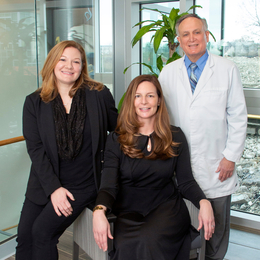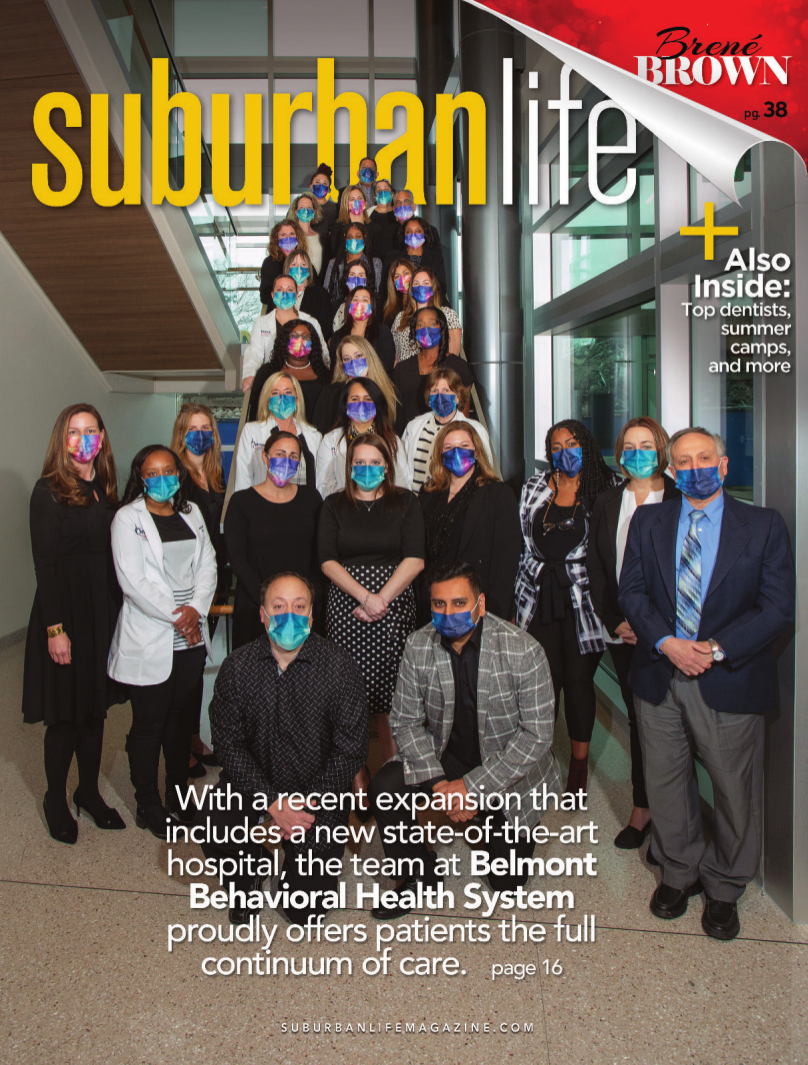
A New Era in Behavioral Health
With a recent expansion that includes a new state-of-the-art hospital, the team at Belmont Behavioral Health System proudly offer patients the full continuum of care.
Patients have gotten used to hearing healthcare providers use the phrase continuum of care, and for good reason. A provider’s ability to offer a comprehensive range of services, to evolve with patients along the various stops of their journey, and to take a compassionate approach to healing has led to better outcomes and more satisfying experiences for staff and patients alike.
Yet, when it comes to behavioral health, the model can sometimes be difficult to find. Fortunately for those in Philadelphia and surrounding areas, a healthcare system with a rich history of providing personalized, evidence-based treatment for patients of all ages for the past 75 years has embraced the concept. Belmont Behavioral Health System has proven its commitment to a continuum of care with several major initiatives, including a $140 million hospital that opened last June.
“One of the things that attracted me to Belmont in the first place is that you really make an investment in the person and their wellness if you invest in the whole continuum of care, rather than one aspect of their treatment,” says Laura Longstreet, who has been CEO for the past four years. “I think it speaks volumes as a provider that we’re very engaged with our patients and their families, and strive to keep them out of the hospital. The hospital is here should they need it, but we have great evidence-based treatments that have been happening for years in our outpatient setting, and they’ve really informed our inpatient practice.”
At Belmont, caregivers meet patients where they are, ensuring seamless transitions as their needs change, and offering appropriate programs to address patients’ specific problems. That could mean an inpatient stay at the hospital for a mental health or substance abuse disorder, a combination of traditional and innovative outpatient services, or access to the Philadelphia Children’s Crisis Response Center, the only one of its kind in the city.
“At this point with our expansions, we are the largest behavioral health provider in the area because we offer the full continuum,” Longstreet says. “A lot of people do the same work, but not under one system of care.”
Adria Filmore, Psy.D., Belmont’s executive director of outpatient services, is proud of the organization’s commitment. Cutting-edge treatment options include cognitive behavior therapy (CBT) for depression and anxiety, parent-child interaction therapy (PCIT) for children presenting with challenging behaviors, and dialectical behavioral therapy (DBT) for severe trauma, among many others.
“One of the major improvements for outpatient that came with this expansion was the ability to offer higher levels of care,” Dr. Filmore says. “For many years, we focused on traditional outpatient services, such as weekly psychotherapy and psychiatry. We identified, however, that we needed something in between outpatient and inpatient services to support the transition for individuals, and were able to build IOP (intensive outpatient programming) and PHP (partial hospitalization programs) to fill that need. We’ve been able to expand for both children/adolescents and adults in that regard.”
For those who require an inpatient setting, the crown jewel of Belmont’s recent makeover is the six-story, state-of-the-art hospital, which increased its number of beds from 180 to 252. Replacing its dark and dated predecessor, the sleek new facility has an abundance of windows and natural light, resulting in a much more inviting space. Artwork designed by patients and employees adorns the walls, and soothing colors can be found in patient rooms, along with modern amenities. The campus features specially designed sensory rooms to provide serenity for patients in moments of crisis, along with two outdoor healing gardens.
Safety was also top of mind, with anti-ligature restrooms and showers and excellent lines of sight from nursing stations to the unit and primary therapy spaces. Larger hallways and conference areas can accommodate group programs and employee collaboration, and expanded offerings include an autism program and a neuromodulation unit with a suite for transcranial magnetic stimulation and electroconvulsive therapy.
Longstreet also notes the importance of an affiliation with Children’s Hospital of Philadelphia (CHOP) to provide adolescent and pediatric medical care, further strengthening the integration of care. Finally, the hospital also includes New Oaks Academy, an onsite private school for children to ensure that students do not fall behind in their studies while receiving care.
“We have a lot of individuals who wind up staying with us for extended periods of time—longer than what a traditional inpatient stay should look like for children and adolescents,” Longstreet says. “It was an area of concern for the clinical teams, just how hard it was for children to reintegrate into a school-based setting having missed so much schooling. So, in November we were very pleased that we officially received licensure from the Pennsylvania Department of Education.”
Speaking of education, Belmont has long had a stellar reputation for teaching and training future clinicians. That role has only grown in recent years through academic affiliations with Jefferson Health, Albert Einstein Medical Center, Philadelphia College of Osteopathic Medicine, and CHOP.
“This is a very active academic training place, which makes us distinguished from a lot of other psychiatric facilities in the area,” says Fayez El-Gabalawi, M.D., chief medical officer at Belmont and also an associate professor of psychiatry at Thomas Jefferson University. “We have a large number of trainees covering everything from students to residents to fellows. We have a strong group of physicians who are dedicated to teaching and mentoring.”
Dr. Filmore cites the invaluable hands-on training Belmont provides to the next generation of clinicians.
“One of the highlights is training our psychiatry residents and psychology pre-doctoral interns in DBT at the beginning of their time here,” she says. “They consult with me throughout the year regarding the application of this treatment, and they’re in all the levels of care using the interventions. Importantly, they get firsthand experience with this evidence-based, trauma-informed practice, which not only helps our patients but will prove to be a significant future asset as they go on to help others.”
Dr. El-Gabalawi is most proud when those students go on to distinguished careers in the field. Some of them even join Belmont.
“When I see attending physicians operating here who were residents or students, and now they’re colleagues and doing their own work, it’s a tremendous reward,” he says. “It’s refreshing, and it makes us feel like we’re on the right track when they adopt our philosophy in treatment and are helping others.”
At the end of the day, helping others is what drives the team at Belmont. The recent expansions have made treatment for behavioral health more visible and accessible to the community, according to Longstreet, and that means more people will feel motivated to get the assistance they need.
“We want to break down those walls and reduce the stigma associated with people seeking treatment, because we all know somebody who can benefit from behavioral health treatment,” she concludes. “Behavioral health has been stigmatized for so long that people still get confused about how to access care. One of the things we like about having the continuum is you can just make the call and we’ll help you navigate the system to meet your needs.”
Longstreet cites the following organizations as instrumental to the new hospital’s planning, design, and construction: Acadia Healthcare, Johnson Johnson Crabtree Architects P.C., and ALPA Construction Inc. In addition, she says community support from the Wynnefield Heights Civic Association was vital to the hospital’s success, while the entire Belmont leadership team “kept our vision for high-quality, patient-centered care alive as we pushed through this project” amid the tumultuous conditions of the last few years.
Belmont Behavioral Health System
4200 Monument Road
Philadelphia, PA 19131
(855) 588-9831
belmontbehavioral.com
4200 Monument Road
Philadelphia, PA 19131
(855) 588-9831
belmontbehavioral.com
Photograph by Alison Dunlap
Published (and copyrighted) in Suburban Life magazine, January 2022.



